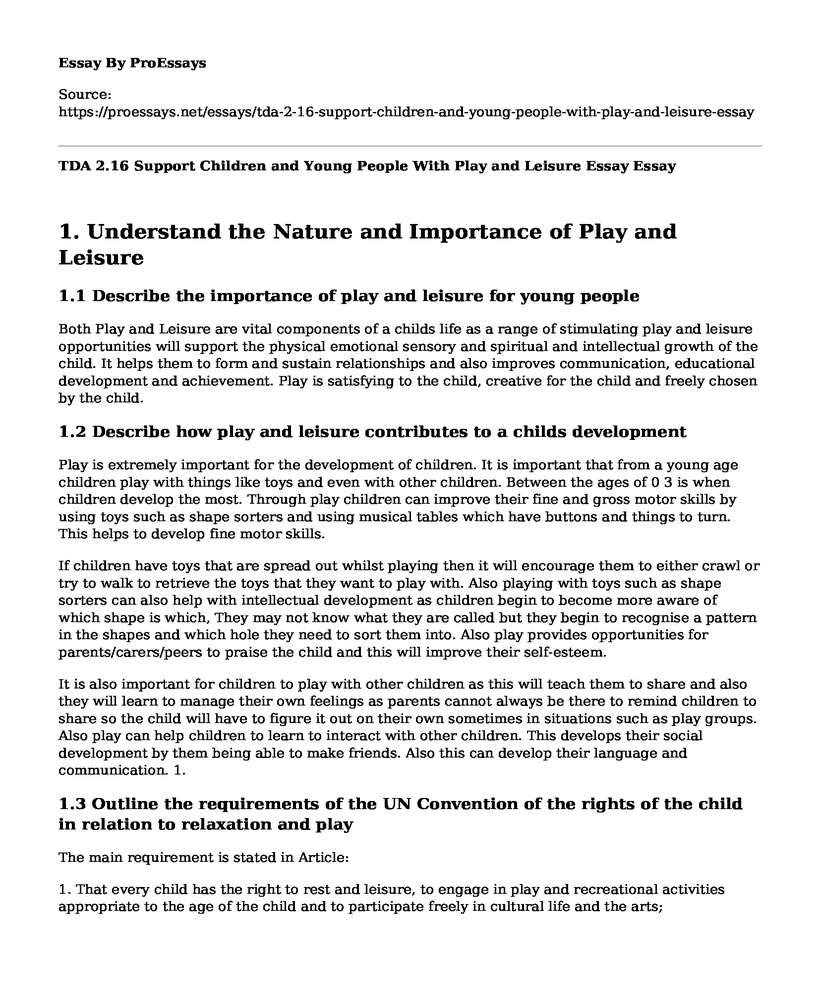1. Understand the Nature and Importance of Play and Leisure
1.1 Describe the importance of play and leisure for young people
Both Play and Leisure are vital components of a childs life as a range of stimulating play and leisure opportunities will support the physical emotional sensory and spiritual and intellectual growth of the child. It helps them to form and sustain relationships and also improves communication, educational development and achievement. Play is satisfying to the child, creative for the child and freely chosen by the child.
1.2 Describe how play and leisure contributes to a childs development
Play is extremely important for the development of children. It is important that from a young age children play with things like toys and even with other children. Between the ages of 0 3 is when children develop the most. Through play children can improve their fine and gross motor skills by using toys such as shape sorters and using musical tables which have buttons and things to turn. This helps to develop fine motor skills.
If children have toys that are spread out whilst playing then it will encourage them to either crawl or try to walk to retrieve the toys that they want to play with. Also playing with toys such as shape sorters can also help with intellectual development as children begin to become more aware of which shape is which, They may not know what they are called but they begin to recognise a pattern in the shapes and which hole they need to sort them into. Also play provides opportunities for parents/carers/peers to praise the child and this will improve their self-esteem.
It is also important for children to play with other children as this will teach them to share and also they will learn to manage their own feelings as parents cannot always be there to remind children to share so the child will have to figure it out on their own sometimes in situations such as play groups. Also play can help children to learn to interact with other children. This develops their social development by them being able to make friends. Also this can develop their language and communication. 1.
1.3 Outline the requirements of the UN Convention of the rights of the child in relation to relaxation and play
The main requirement is stated in Article:
1. That every child has the right to rest and leisure, to engage in play and recreational activities appropriate to the age of the child and to participate freely in cultural life and the arts;
2. That member governments shall respect and promote the right of the child to participate fully in cultural and artistic life and shall encourage the provision of appropriate and equal opportunities for cultural, artistic, recreational and leisure activity.
However throughout the UNCRC various other articles touch on relaxation and play: Article 3 states that, in all actions concerning children, the best interests of the child shall be a primary consideration; Article 12 gives the child the right to express his/her views freely and have them considered. Article 29 The Convention also states that education should be directed to a broad range of developmental areas, including the childs personality, talents, and mental and physical abilities.
Article 24 Play and recreation activities can play a significant role in fulfilling the childs right to the highest attainable standard of health and to preventive health care, Article 23 gives children with disabilities the right to recreation and the fullest possible social integration and individual development. Article 30 states that children of ethno-cultural minorities, or of indigenous origin, have the right to enjoy their own culture, which would include their own forms of play/recreation. Article 19 is also relevant to play and recreation in that it aims to prevent child abuse and childhood injury.
Adults have a responsibility to ensure that children have safe environments and materials for their leisure activities.
1.4 Describe the characteristics of freely chosen self directed play and leisure
The characteristics of freely chosen, self-directed play:
- Freely Chosen - children can choose what they want to do. They have a choice.
- Personally directed - children choose how they want to do it, they can experiment.
- Self motivated - children choose why they do it not adults.
- Goalless - they do it for no externally goal or reward just for fun.
Cite this page
TDA 2.16 Support Children and Young People With Play and Leisure Essay. (2022, Jul 15). Retrieved from https://proessays.net/essays/tda-2-16-support-children-and-young-people-with-play-and-leisure-essay
If you are the original author of this essay and no longer wish to have it published on the ProEssays website, please click below to request its removal:
- Assignment Example on Unprofessional Conduct
- Should Children Carry Cell Phones To School? - Essay Sample
- Text Mining and Text Analytics Paper Example
- Goals and Activities of Four Seasons Child Care Paper Example
- Intersectional Approach: Exploring Justice Barriers in Society - Essay Sample
- Essay Example on Prosocial/Antisocial Modeling & Its Impact on Children's Growth
- Free Essay Sample on Overcoming Bullying: Evaluating Therapeutic Approaches







